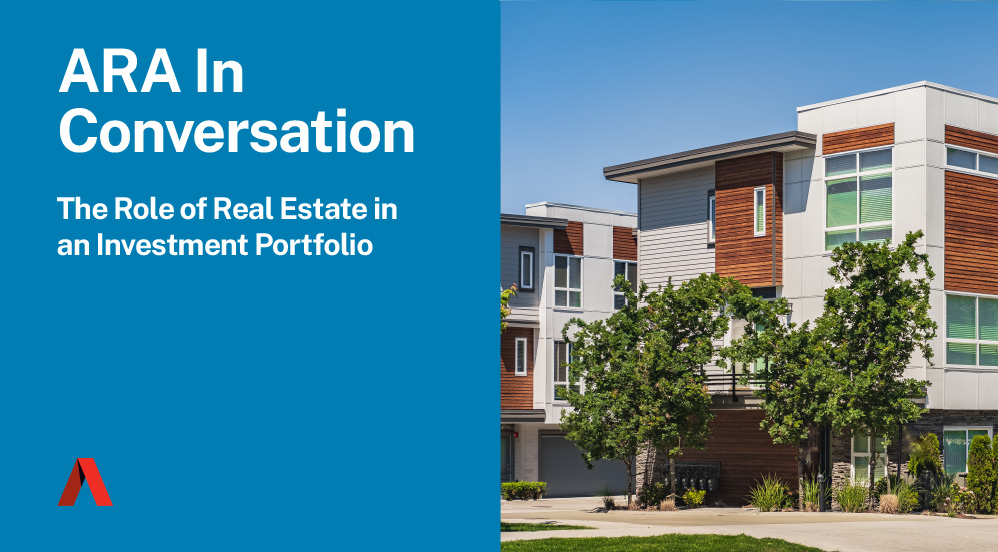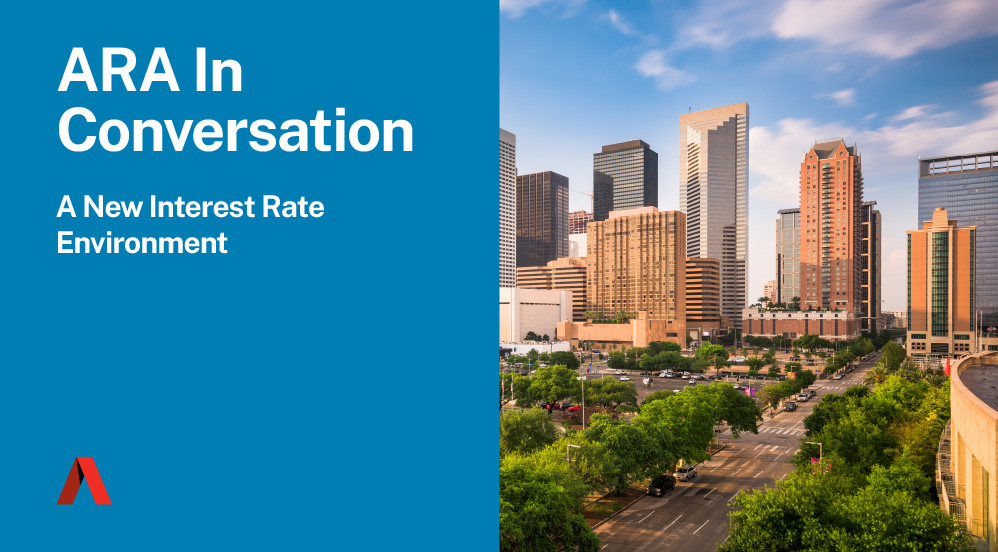Market Commentary, May 20, 2025
In Conversation: A New Real Estate Cycle
Real estate fundamentals are solid, and transaction activity has seen an uptick despite uncertainty in the macroeconomy – all signs pointing to a real estate recovery. In our latest installment of In Conversation, ARA’s Scott Darling and Sabrina Unger discuss where we are in the real estate market cycle and how investors can evaluate their portfolios for success.
---
Scott Darling: Hello, I'm Scott Darling, and I head up the Portfolio Management functions here at ARA. I'm here with Sabrina Unger, the Managing Director of Research and Strategy. We're here today to talk a little bit about real estate market cycles. Sabrina, to start things off, we know a lot of investors have been looking for an indication that maybe we've reached a market bottom or started a recovery. Tell us how you're seeing things.
Sabrina Unger: I think we would describe the recovery as being generally underway. In early 2024, in fact, we put out a piece that was outlining some of the green shoots we were seeing in the marketplace, even then, and I think those green shoots are really firming up as we enter 2025.
We look at things like fundamentals – both occupancy and rent seem to be finding their floor, transaction activity is starting to pick back up, and that's really a function of financing conditions becoming a little less restrictive, ultimately, that of course is tied to the broader capital markets cycle and what's happening with interest rates. Pricing indices are still soft, but those too are sort of stabilizing. And so, when we put all that together, it seems that we're in an environment where there are reasons to be optimistic that the recovery is, in fact, underway.
SD: Those are some encouraging signs. Why don't we take maybe a step back and take a bigger picture look at real estate market cycles. How do you kind of break down a real estate market cycle, and what might you expect to see at each stage of the cycle?
SU: I think we would generally describe real estate cycles as being comprised of four distinct parts or phases. We look back over the last 18 to 20 months, and I think most would agree we were in the final stage of the last cycle.
We had a situation where we were oversupplied, demand was softening, and rents were flat to contracting. The good news about being in the fourth or final phase of a real estate cycle is that typically what comes next is the early stage of a new cycle. What we expect to see in that environment is a situation where vacancies have started to flatten out, maybe even turn the corner and start to decline.
Rents begin to go up, demand solidifies, but at the same time, it's not a combination that's quite compelling enough to spur a big round of new construction starts. And so early phase is really categorized by vacancies starting to get better, rents turning the corner, demand solidifying, but not yet a lot of supply to contend with – so I think we're firmly in the early phase of a new cycle.
SD: So that's interesting. So maybe the last time we were in a similar cyclical position was – what do you think? Maybe you go back around 2010 in the early years following the Global Financial Crisis. What do you think might be similar or different as we move through the cycle this time around?
SU: I think that's a good question, because most people want to be able to anchor what we think comes next based on what has happened in the past. When we look back, the Global Financial Crisis was the worst recession in modern history. I think a similarity between the 2010 and 2013 era and where we are today is what's happening with supply. In the early 2010s period, supply was essentially shut off. There was virtually nothing being delivered, and I think we're seeing a similar response today. Pipelines are clearing really quickly, and it's much harder to get new projects off the ground. So I think that's similar.
Where the difference comes in is the destruction or relative destruction of demand. The Global Financial Crisis was so horrible for businesses and consumers, and so it took a lot longer for the economy to bounce back, it took a lot longer for businesses to want to make space decisions, and so the trough for vacancies and rents was much longer than what we anticipate this time around.
Businesses and consumers are fundamentally in a much better position today, unemployment is still very low, a lot of businesses were able to lock in long-term, fixed-rate debt at relatively low interest rates, and so that's going to allow things to bounce back in a much quicker way than what we saw after the Global Financial Crisis.
SD: You gave us a great reminder that no two cycles are the same, and certainly there's lessons to be learned in in every cycle. What do you think real estate investors are going to need to be focused on over the next couple of years as we advance through this next cycle?
SU: I think investors need to be asking their managers, “how are you going about managing expense growth?”
And the reason that this is so important at this stage in the cycle is that we do believe that there is still inflationary pressure embedded in the broader economy. So to the extent that inflation does come back, it's going to be really critical to control expense growth, particularly when rent growth isn't accelerating just yet.
We need to be able to manage that net operating income, and so that ultimately comes down to managing expenses and being really thoughtful and hands-on with asset management. I think that's a critical lesson. I think another part of it is not anticipating cap rate compression to save the day and drive total returns. That had been a driver in the post-GFC cycle because interest rates dropped down to zero and there was ability for cap rates to compress and drive the appreciation component of total returns.
Again, given our outlook, the interest rates stay higher for longer, cap rate compression as a function of lower interest rates does not seem like it's going to be the “save all” that that might have occurred in past cycles.
And finally, I think another element to remember is just because we're turning the corner doesn't mean that every market or sector or submarket is all going to start to win at the same time. I think ultimately we still need to keep in mind selection matters, and just because the tides are turning doesn't mean that everybody's going to recover at the same pace.
SD: Well, thank you for your time and thank you for sharing your thoughts with us today, Sabrina.
SU: Thank you.
This transcript of the ARA In Conversation discussion has been edited for clarity.
Discover More
---
Disclaimer
The information in this video is as of March 1, 2025, unless specified otherwise and is for your informational and educational purposes only, is not intended to be relied in to make any investment decisions, and is neither an offer to sell nor a solicitation of an offer to buy any securities or financial instruments in any jurisdiction. This presentation expresses the views of American Realty Advisors, LLC (ARA) as of the date indicated and such views are subject to change without notice. The information in this video has been obtained or derived from sources believed by ARA to be reliable but ARA does not represent that this information is accurate or complete and has not independently verified the accuracy or completeness of such information or assumptions on which such information is based. Models used in any analysis may be proprietary, making the results difficult for any third party to reproduce. Past performance of any kind referenced in the information above in connection with any particular strategy should not be taken as an indicator of future results of such strategies. It is important to understand that investments of the type referenced in the information pose the potential for loss of capital over any time period. This video is proprietary to ARA and may not be copied, reproduced, republished, or posted in whole or in part, in any form and may not be circulated or redelivered to any person without the prior written consent of ARA.
Forward-Looking Statements
This video contains forward-looking statements within the meaning of federal securities laws. Forward-looking statements are statements that do not represent historical facts and are based on our beliefs, assumptions made by us, and information currently available to us. Forward-looking statements in this video are based on our current expectations as of the date of this presentation, which could change or not materialize as expected. Actual results may differ materially due to a variety of uncertainties and risk factors. Except as required by law, ARA assumes no obligation to update any such forward-looking statements.


